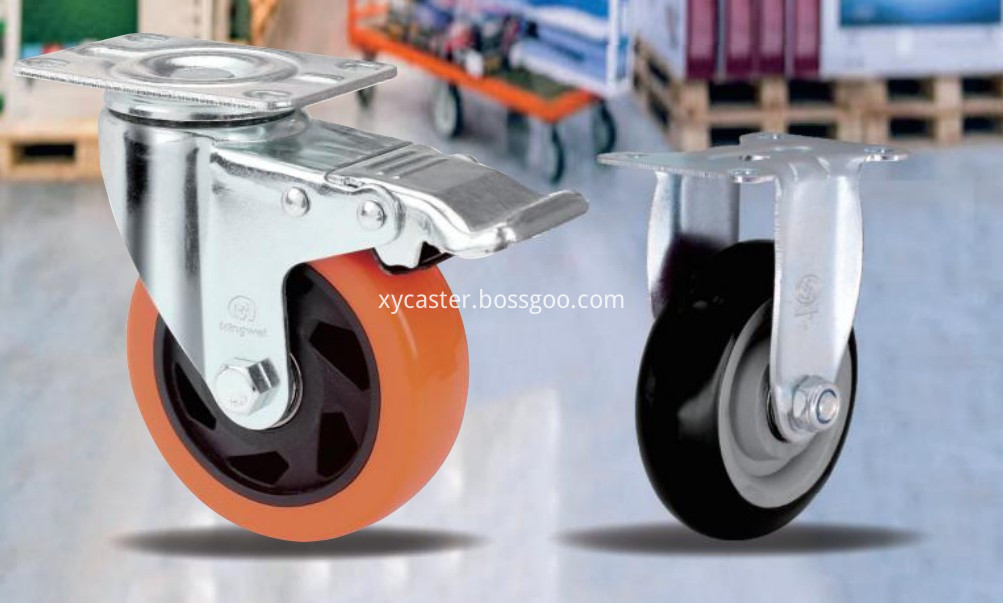First, the bacterial wilt of peanut
1. 3 /4/ 5 inch Medium Duty Caster Wheel PVC/ PU / TPR
2. High quality galvanized support
3. Single wheel PVC / PU / TPR / PVC material
4. Double ball bearings caster wheels
Medium Duty Caster Wheels,Medium Duty Casters,Caster Wheel Swivel Type,Replacement Swivel Wheels Yangjiang Xingyang Industry & Trade Co.,Ltd. , https://www.xycaster.com

Peanut high-yield disease prevention
The disease occurs mostly from the peanut seedling stage to the pod-forming stage. The spring peanuts are from May to June, and the summer peanuts are from September to October. The incidence rate is heavier. The susceptible plants initially sag, and then the leaves of the whole plant sag, but the wilted leaves can still maintain a turquoise color. The stems are cut open, and the transporting tissue near the ground can be seen to have turned brown. At the broken incision, the dirty white bacteria flowed out, and the diseased plant was pulled up, and the roots had rotted to become dark brown. The control measures are as follows:
1. Reasonable rotation, rational rotation with non-parasitic crops, such as peanut and corn rotation to eliminate pathogens in the soil;
2. Select resistant varieties such as “Baisha 1016 Seedâ€;
3. Improve soil, pay attention to drainage, apply more decomposed organic fertilizer, when planting peanuts, 667 square meters of planting wood ash 50kg ~ 150kg, 12% calcium magnesium phosphorus 20kg ~ 30kg, can promote healthy growth of peanuts, improve disease resistance;
4. Chemical Control
1 When peanuts are planted, it can effectively control the occurrence of peanut bacterial wilt by using green enjoyment No. 1 or fulvic acid seed dressing. The application method is to use 1g ~ 2g or fulvic acid 2g ~ 3g per kg of seeds. Mix well and sown, the control effect can reach 80%~90%
2 In the peanut seedling stage or in the onset period, the spraying effect is more than 90% with the King of Sandy King or 1000 times to 1500 times of the gold. The weight of the disease is 667 square meters when using 179 square meters of sand or 35g to 15kg~20kg. Rooting, the effect is very good.
Second, peanut leaf spot disease
Peanut leaf spot, which has brown spot and black spot. During peanut growth, it generally occurs that mixing occurs on the same plant or even on the same leaf. Brown spot disease occurs earlier, black spot disease occurs later, and the control measures are as follows:
1. Strengthen the field management, and remove the residual leaf disease plants in time after harvesting the crops to eliminate the source of the dyeing.
2. Rational fertilization, increase the application of calcium and magnesium fertilizers and potassium fertilizer to improve the disease resistance of peanuts.
3. Chemical control can control the spread of diseases, maintain a long green leaf for long-term, and prolong the time of photosynthesis:
1 Spraying 1500 times to 2000 times of the king of sand bacteria in the growth period 2 times to 3 times, with an interval of 15 days to 20 days, the control effect can reach 93%;
2 In the seedling period, 667 square meters with 0.5g of water and 15kg to 20kg of water, continuous spraying for 3 times to 4 times, each interval of 15 days to 20 days, the control effect is above 95%, at the same time, can prevent other diseases occur.
In addition, the strong anti-disease and increasing-yielding agents "Salmon King", "Everywhere" and "Huangyeqing" have a certain preventive effect on preventing the occurrence of peanut virus disease. In the prevention and treatment of diseases such as bacterial wilt and leaf spot, mixed spraying It can enhance disease resistance and increase production by more than 30%.
Total 1 | <First <Prev 1 Next> Last> |
share to: